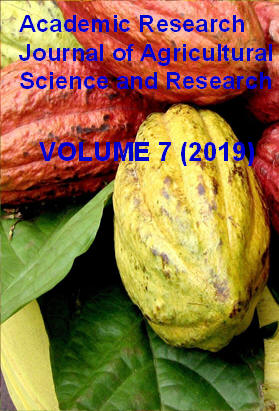|
ISSN: 2360-7874 |
Academic Research Journal of
Agricultural Science and Research |
|||||||||||||||||||
|
Vol. 7(5), pp. 227-230, July 2019 Review Development of laundry soap from jatropa, castor and palm oils
Seferu Tadesse Wubie
Department of Chemistry, Wondo Genet Agricultural Research Center, EIAR, P.O. Box: 198, Shashemene, Ethiopia. Corresponding authors email:seferutadesse5@gmail.com, phone # +251972736148
Accepted 20 March 2019
The activity of the contribution arises out of the actual situation in the Ethiopia, where the Lower class of peoples didn’t use soap because they hadn’t money to buy soap from market. This led up to serious problems with sanitation and causes for different diseases. For this reason the experiment was conducted with the objective of developed and evaluated soap by substitute edible oil with nonedible (jatropha, castor and palm) oils. Jatropha, castor and palm oil is nonedible oil which has more benefits to soap making. It has also cosmetics and medicinal properties. Several parameters were considered for developed laundry soaps from jatropha, castor and palm oils. Values of pH for jatropha, castor and palm oil soap were 6.8, 7.4 and 7.2, for maximum moisture and volatile matter content at 105 °C were 29.18, 28.82 and 30, for minimum total fatty matter 62.3, 62.57 and 62.6, for maximum total free fat (unsaponified and unsaponifiable fatty matter) 0.18, 0.19 and 0.15, for maximum matter insoluble in water 0.2, 0.16 and 0.13, for maximum matter insoluble in ethanol 2.2, 1.9 and 1.86, for maximum chloride content as NaCl 0.15, 0.3 and 0.25, for maximum total free alkali as sodium hydroxide ND, 0.16 and 0.18, for maximum free caustic alkali as sodium hydroxide ND, 0.02 and 0.04 respectively. From the activity it can be conclude that the chemical properties of developed soap were within the limits set by standards of East African laundry soap and humans made easily in their homes.
Key Words: Jatropha, Castor, Palm, Soap making
How to cite this article (APA Style): Seferu TW (2019). Development of laundry soap from jatropa, castor and palm oils. Acad. Res. J. Agri. Sci. Res. 7(5): 227-230
|
|||||||||||||||||||
